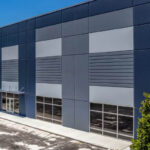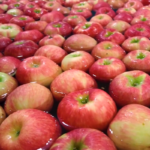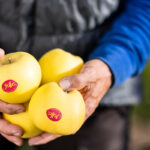Japan's Inaba Peanuts Co., Ltd. improves product consistency and increases production volumes by acquiring a TOMRA 5B optical sorter

PRESS RELEASE
Inaba Peanuts Co., Ltd. produces more types of food than its name suggests. Established more than a century ago as a maker of rice crackers in 1918, the business began to specialize in processing peanuts since 1947. It now also produces snacks such as almonds, cashews, walnuts, chestnuts, Japanese Dried plums, Almond fish, and Fried beans. At its four factories in Gifu Prefecture in central Japan, the company’s mission is to produce foods with “safety, security, and deliciousness”.
Inaba’s almonds and cashews became so popular that the company faced two significant challenges. One was the need to increase output to keep up with demand - but production rates were restricted by bottlenecks because of heavy reliance on manual sorting. The other was to achieve fewer variations in product quality - but again, the traditional method of manually sorting nuts was limiting achievable consistency.
Reassured by TOMRA Food’s approach
Inaba Peanuts Co., Ltd.’s President and CEO, Mr.YoIchi Ogura, found solutions to both these challenges when he attended FOOMA JAPAN, the international food machinery and technology exhibition, in 2017. Visiting the stand of TOMRA Food, Mr. Ogura quickly recognized that TOMRA’s industry-leading sorting machines could help Inaba achieve both its targets: higher production volumes and consistent product quality.
What’s more, TOMRA’s sorters could also help Inaba reduce food waste and improve yields. This is important not only for business efficiency but also because consumers increasingly expect food producers to adopt sustainable business practices.
Mr. Ogura was also encouraged by the fact that TOMRA Food works closely with customers, regarding working relationships as partnerships with shared objectives. And he was reassured to learn that TOMRA is willing to demonstrate its machines’ capabilities by running tests with customers’ infeed materials, and to prove that the results of these tests are repeatable. TOMRA Food’s engineers also fine-tune machine settings for each individual food application and production plant to ensure optimal performance.
When TOMRA Food reviewed Inaba Peanuts’ requirements, it was clear that the company needed the TOMRA 5B optical sorting machine. Inaba took delivery of a TOMRA 5B in September 2021 and is delighted with the results.
The sorter delivers multiple benefits
Mr. Ogura commented: “Even though we assigned a large number of skilled personnel to our almond and cashew nut lines to sort-out foreign materials and defective products, and even though these people were very good at their jobs, we weren’t happy with the variation in quality. The other problem was that our workforce was aging, and inspection work on production lines doesn’t appeal to the younger generation. Finding people to do this work was becoming a significant issue.”
“The TOMRA 5B has solved these problems. There is no longer any variation in quality. The standards of the end product are very stable even when the quality of infeed materials varies. The machine works faster than people can. We no longer have the struggle of trying to recruit people to do a job they don’t wish to do. And with its touchscreen control, operators like the way TOMRA’s machine is easy to set up and control.”
TOMRA’s sorter has also delivered two other significant benefits: it has helped Inaba reduce food waste, and has made it possible to sustain high production volumes. Mr. Ogura said: “Thanks to the way TOMRA’s engineers respond promptly and remotely to our needs, there has never been a decrease in production volumes. And there is minimal machine downtime, only for routine maintenance.”
The TOMRA 5B’s high-level capabilities
The TOMRA 5B is designed to remove unwanted objects from processing lines quickly. Nuts are spread uniformly on the machine’s infeed belt. Foreign material and product imperfections are detected by on-belt 360-degree-surround cameras, which see the parts of the product other machines cannot, and off-belt cameras. By adding a laser to this machine, it is possible to detect and eject more than 98% of foreign materials such as plastics. The laser is also highly effective at detecting almond shells.
A few milliseconds after inspection, unwanted objects - identified by color and shape - are rejected in one or two separate reject streams by small-pitch ejector valves positioned at the end of the infeed belt. The good produce continues its way along the processing line. And through the method of three-way sorting, it is possible to sort products into three categories: for accepting as saleable product, rejecting as unsaleable product, and recuperating for use in processed foods - reduce food waste enhancing profitability.
About TOMRA Food
TOMRA Food designs and manufactures sensor-based sorting machines and integrated post-harvest solutions transforming global food production to maximize food safety and minimize food loss, by making sure Every Resource Counts. These solutions include advanced grading, sorting, peeling and analytical technology to help businesses improve returns, gain operational efficiencies, and ensure a safe food supply.
The company has more than 12,800 units installed at food growers, packers and processors around the world for confectionery, fruit, dried fruit, grains and seeds, potatoes, proteins, nuts, and vegetables.
TOMRA Food operates centers of excellence, regional offices and manufacturing locations within the United States, Europe, South America, Asia, Africa and Australasia.
TOMRA Food is a division of TOMRA Group. TOMRA was founded in 1972 that began with the design, manufacturing and sale of reverse vending machines (RVMs) for automated collection of used beverage containers. Today, TOMRA is leading the resource revolution to transform how the planet’s resources are obtained, used and reused to enable a world without waste. The company’s other business divisions comprise TOMRA Recycling, TOMRA Mining and TOMRA Collection.
TOMRA has approximately 100,000 installations in over 80 markets worldwide and had total revenues of ~10.9 billion NOK in 2021. The Group employs ~4,600 globally and is publicly listed on the Oslo Stock Exchange. The company headquarters are in Asker, Norway.
For further information about TOMRA, visit www.tomra.com.














































